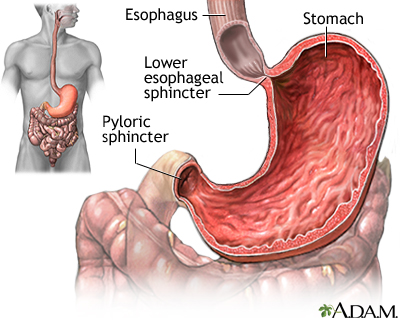Gastroparesis
Gastroparesis diabeticorum; Delayed gastric emptying; Diabetes - gastroparesis; Diabetic neuropathy - gastroparesis
Gastroparesis is a condition that reduces the ability of the stomach to empty its contents. It does not involve a blockage (obstruction).
Images


Causes
The exact cause of gastroparesis is unknown. It may be caused by a disruption of nerve signals to the stomach. The condition is a common complication of diabetes. It can also follow some surgeries.
Risk factors for gastroparesis include:
- Diabetes
- Gastrectomy (surgery to remove part of the stomach)
- Systemic sclerosis
- Use of medicine that blocks certain nerve signals (anticholinergic medicine)
Symptoms
Symptoms may include:
- Abdominal distention
- Abdominal pain
- Hypoglycemia (in people with diabetes)
- Nausea
- Premature abdominal fullness after meals
- Weight loss without trying
- Vomiting
Exams and Tests
Tests you may need include:
- Esophagogastroduodenoscopy (EGD)
- Gastric emptying study (using isotope labeled food)
- Upper GI series
Treatment
People with diabetes should always control their blood sugar level. Better control of blood sugar level may improve symptoms of gastroparesis. Eating small and more frequent meals and soft foods may also help relieve some symptoms.
Medicines that may help include:
- Cholinergic drugs, which act on acetylcholine nerve receptors
- Erythromycin
- Metoclopramide, a medicine that helps empty the stomach
- Serotonin antagonist drugs, which act on serotonin receptors
Other treatments may include:
- Botulinum toxin (Botox) injected into the outlet of the stomach (pylorus)
- Electrical stimulation of the stomach
- Surgical procedure that creates an opening between the stomach and small intestine to allow food to move through the digestive tract more easily (gastroenterostomy)
Outlook (Prognosis)
Many treatments seem to provide only temporary benefit.
Possible Complications
Ongoing nausea and vomiting may cause:
- Dehydration
- Electrolyte imbalances
- Malnutrition
People with diabetes may have serious complications from poor blood sugar control.
When to Contact a Medical Professional
Changes in your diet may help control symptoms. Contact your health care provider if symptoms continue or if you have new symptoms.
Related Information
DiabetesScleroderma
Gastrectomy
Comprehensive metabolic panel
Dehydration
References
Bircher G, Woodrow G. Gastroenterology and nutrition in chronic kidney disease. In: Feehally J, Floege J, Tonelli M, Johnson RJ, eds. Comprehensive Clinical Nephrology. 6th ed. Philadelphia, PA: Elsevier; 2019:chap 86.
Camilleri M. Disorders of gastrointestinal motility. In: Goldman L, Schafer AI, eds. Goldman-Cecil Medicine. 26th ed. Philadelphia, PA: Elsevier; 2020:chap 127.
Koch KL. Gastric neuromuscular function and neuromuscular disorders. In: Feldman M, Friedman LS, Brandt LJ, eds. Sleisenger and Fordtran's Gastrointestinal and Liver Disease. 11th ed. Philadelphia, PA: Elsevier; 2021:chap 50.
BACK TO TOPReview Date: 11/3/2022
Reviewed By: Michael M. Phillips, MD, Emeritus Professor of Medicine, The George Washington University School of Medicine, Washington, DC. Also reviewed by David C. Dugdale, MD, Medical Director, Brenda Conaway, Editorial Director, and the A.D.A.M. Editorial team.

Health Content Provider
06/01/2025
|
A.D.A.M., Inc. is accredited by URAC, for Health Content Provider (www.urac.org). URAC's accreditation program is an independent audit to verify that A.D.A.M. follows rigorous standards of quality and accountability. A.D.A.M. is among the first to achieve this important distinction for online health information and services. Learn more about A.D.A.M.'s editorial policy, editorial process and privacy policy. A.D.A.M. is also a founding member of Hi-Ethics. This site complied with the HONcode standard for trustworthy health information from 1995 to 2022, after which HON (Health On the Net, a not-for-profit organization that promoted transparent and reliable health information online) was discontinued. |
The information provided herein should not be used during any medical emergency or for the diagnosis or treatment of any medical condition. A licensed medical professional should be consulted for diagnosis and treatment of any and all medical conditions. Links to other sites are provided for information only -- they do not constitute endorsements of those other sites. © 1997- 2024 A.D.A.M., a business unit of Ebix, Inc. Any duplication or distribution of the information contained herein is strictly prohibited.
